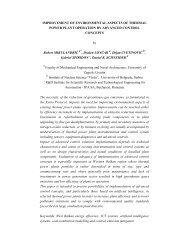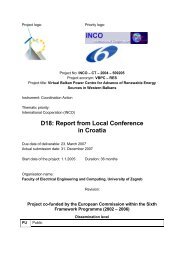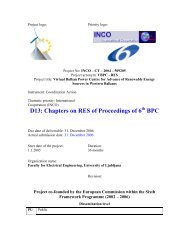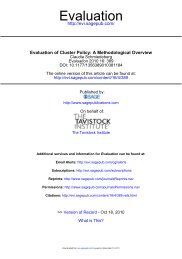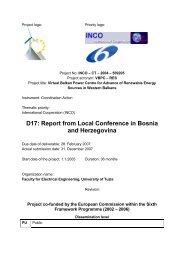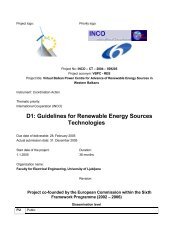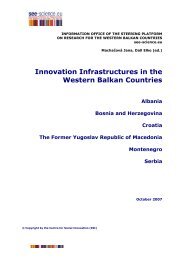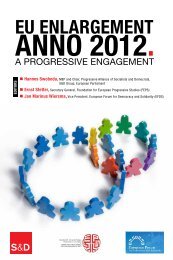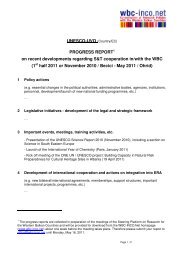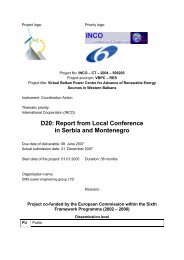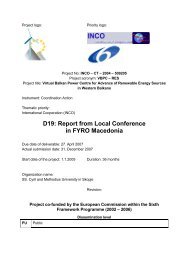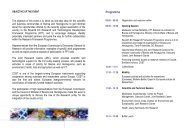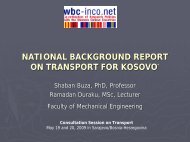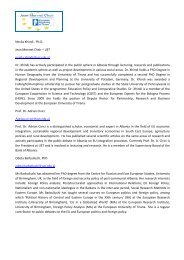- Page 1 and 2: MANJINE I MEDIJI NA ZAPADNOM BALKAN
- Page 3 and 4: Manjine i mediji EVROPSKI STANDARDI
- Page 5 and 6: konstitutivnih naroda stavio u kate
- Page 7 and 8: Pristupanje Dekadi predstavlja pozi
- Page 9 and 10: mediji) svodi se na pitanja socijal
- Page 11 and 12: frekvencija da se zadovolji kulturn
- Page 13: Minorities and media EUROPEAN STAND
- Page 17 and 18: Concerns have been raised regarding
- Page 19 and 20: Professionalism - a foundation for
- Page 21 and 22: Television’s Second Channel are g
- Page 23 and 24: The non-governmental sector is a ve
- Page 25 and 26: Teme variraju zavisno od konteksta
- Page 27 and 28: Depersonalizovani izvori: Riječ je
- Page 29 and 30: U namjeri da se ovi mediji pozicion
- Page 31 and 32: Mediji i nacionalne manjine u Bosni
- Page 33 and 34: 1991. godine i po njemu je u BiH ž
- Page 35 and 36: U Bosni i Hercegovini živi oko 1.0
- Page 37 and 38: sa informisanjem nacionalnih manjin
- Page 39 and 40: tome. Svakako da i nebriga šire dr
- Page 41 and 42: morao da se bavi samo temama koje s
- Page 43 and 44: proizvodnju i emitovanje od slovena
- Page 45 and 46: previše kritički odnos prema medi
- Page 47 and 48: Spremnost za emitovanje programa o
- Page 49 and 50: Sve je prošao i došao na Parlamen
- Page 51 and 52: Ne može se sva odgovornost za „s
- Page 53 and 54: Teme cjelokupnim stanovništvom, po
- Page 55 and 56: Izvještaji i vijesti najzastupljen
- Page 57 and 58: ijetki slučajevi kada se pozivalo
- Page 59 and 60: Negativan novinarski stav uglavnom
- Page 61 and 62: vijest „Radionica sa fokus grupom
- Page 63 and 64: jezika Politika 0 0% 0 0% 0 0% 0 0%
- Page 65 and 66:
fotografijama su uglavnom ili akter
- Page 67 and 68:
generacije, proslavama Đurđevdana
- Page 69 and 70:
Časopis izdaje SKD Cankar (Slovena
- Page 71 and 72:
Struktura tekstova ovog izdanja je
- Page 73 and 74:
osanskohercegovačkom sredinom, ali
- Page 75 and 76:
Povod objave - Zora Cankarjeva 49%
- Page 77 and 78:
Pozicija izvora - Zora Cankarjeva 9
- Page 79 and 80:
itma („Djevojka mala“) što bi
- Page 81 and 82:
koji je na jednoj naučnoj konferen
- Page 83 and 84:
Povod prilozima su aktuelni događa
- Page 85 and 86:
Pozicija izvora: Dominiraju jedinst
- Page 87 and 88:
Sa izrazitom negativnom sadržinom
- Page 89 and 90:
izjava skrati ili da se montiraju p
- Page 91 and 92:
U vezi sa Jasenovcem imamo prilog i
- Page 93 and 94:
Aktuelni događaji diktiraju sadrž
- Page 95 and 96:
Pojedinci ključni izvori Gotovo st
- Page 97 and 98:
Mnogo češća pozitivna nego negat
- Page 99 and 100:
BiH, opštine u kojima je po popisu
- Page 101 and 102:
TV BHT RTRS TV1 FTV Total (Sve naci
- Page 103 and 104:
TV Autorstvo Novinar Agencija Saop
- Page 105 and 106:
Nezavisne novine 4 0 0 0 0 0 4 Euro
- Page 107 and 108:
Dnevni list 5 0 1 1 7 Večernji lis
- Page 109 and 110:
Dnevne novine Pozicija izvora Jedin
- Page 111 and 112:
Total 3 2 4 9 Total 33% 22% 44% 100
- Page 113 and 114:
Projekat „Mediji i nacionalne man
- Page 115 and 116:
Postoje zajednička pitanja položa
- Page 117 and 118:
Finansiranje Nedostatkom novca i ob
- Page 119 and 120:
Bibliografija: Sve o nacionalnim ma
- Page 121 and 122:
I. Ko su zapravo manjinski narodi u
- Page 123 and 124:
II. Zakonska regulativa na papiru i
- Page 125 and 126:
planu medijske prezentacije Dekade
- Page 127 and 128:
države.” 40 Međutim, finansiran
- Page 129 and 130:
identiteta, što se ne bi reklo za
- Page 131 and 132:
savjet.webnode.com informiše i pov
- Page 133 and 134:
najveći broj Hrvata, albanski medi
- Page 135 and 136:
posvećena veća pažnja, kako od s
- Page 137 and 138:
pojedini intervjui potpisani su od
- Page 139 and 140:
Broj izvora Na izvor nije ukazano u
- Page 141 and 142:
Karakter sadržine teksta Tekstovi
- Page 143 and 144:
Od 217 informacija čak 203 su foku
- Page 145 and 146:
Audiovizuelna prezentacija Vijesti
- Page 147 and 148:
Novinarski uklon Novinari nikada ne
- Page 149 and 150:
Uređivačka politika TV Boin je di
- Page 151 and 152:
Audiovizuelna prezentacija Prilozi
- Page 153 and 154:
Novinarski uklon Vrijednost novinar
- Page 155 and 156:
Ostalo 21 8% 0 0% 0 0% 21 7.5% Tota
- Page 157 and 158:
U nedjeljniku preovlađuju pseudodo
- Page 159 and 160:
Novinarski uklon Vrijednost novinar
- Page 161 and 162:
Tematika Fokus na sopstvenu manjinu
- Page 163 and 164:
Novinarski žanrovi Od žanrova pre
- Page 165 and 166:
Vrsta izvora U 87% tekstova izvori
- Page 167 and 168:
Radio Dux Radio Dux je osnovala nev
- Page 169 and 170:
Autorstvo Emisiju vodi i uređuje n
- Page 171 and 172:
Broj izvora U 52% slučajeva nalazi
- Page 173 and 174:
Sadržaj objava Čak 89% informacij
- Page 175 and 176:
- Manjinski mediji su dužni da u s
- Page 177 and 178:
MINORITY MEDIA IN THE FIGHT FOR SUR
- Page 179 and 180:
I. MEDIJSKI SISTEM U MAKEDONIJI I P
- Page 181 and 182:
ukupno 2,022.547 stanovnika. 78 Od
- Page 183 and 184:
Implementacija ovih odredbi kasnije
- Page 185 and 186:
Pri ocjenjivanju kvaliteta podnesen
- Page 187 and 188:
Almakos i Portalb. 90 Ne postoje in
- Page 189 and 190:
Centralne vijesti, koje su predmet
- Page 191 and 192:
Ovo se može potkrijepiti i ako se
- Page 193 and 194:
Povod objave - MTV - program na alb
- Page 195 and 196:
Redakcija na albanskom jeziku javno
- Page 197 and 198:
Vrijednost sadržaja objave - MTV p
- Page 199 and 200:
žene u ovoj zajednici je isto tako
- Page 201 and 202:
Zatim, 31,18% otpada na pseudodoga
- Page 203 and 204:
U pogledu vrijednosti novinarskog s
- Page 205 and 206:
produciranog od javnog servisa emis
- Page 207 and 208:
Izvori - MTV - Program na romskom j
- Page 209 and 210:
fudbalske reprezentacije u Rumuniju
- Page 211 and 212:
Povod objave - MTV - Program na vla
- Page 213 and 214:
30. marta u emisiji Vidik je emitov
- Page 215 and 216:
Teme Prilozi o događajima u Makedo
- Page 217 and 218:
odnosno press-konferencije, aktivno
- Page 219 and 220:
Alsat М Аlsat М je privatna tele
- Page 221 and 222:
Analiza autorstva objava na Alsat M
- Page 223 and 224:
Pozicija izvora - Аlsat М - vijes
- Page 225 and 226:
BTR televizija BTR televizija je je
- Page 227 and 228:
Analiza povoda objavljivanja sadrž
- Page 229 and 230:
Izvori - BTR - Dnevnik (na romskom
- Page 231 and 232:
Unjutrašna politika 90 10% Sport 5
- Page 233 and 234:
Potpisivanje autora novinarskog pro
- Page 235 and 236:
Dopunsko svjetlo na ove podatke bac
- Page 237 and 238:
Od 59 tekstova u kojima je kontekst
- Page 239 and 240:
sa značajnim udjelom događaja u r
- Page 241 and 242:
gleda kroz kolektivističku prizmu,
- Page 243 and 244:
ljudskih resursa ova je redakcija o
- Page 245 and 246:
praksom u javnom servisu koja je us
- Page 247 and 248:
događajima zabilježena je veća
- Page 249 and 250:
održavaju 'u životu', ili preko d
- Page 251 and 252:
postojanju tzv. „etničkih hijera
- Page 253 and 254:
koordinirano funkcionisanje različ
- Page 255 and 256:
other communities in the country. I
- Page 257 and 258:
II. МЕДИУМСКИОТ СИСТ
- Page 259 and 260:
верските и други фа
- Page 261 and 262:
припадници на етни
- Page 263 and 264:
ја спроведува стра
- Page 265 and 266:
Негативните влијан
- Page 267 and 268:
албански и на турск
- Page 269 and 270:
мера во прилозите з
- Page 271 and 272:
Повод за прилогот Б
- Page 273 and 274:
турски или на влашк
- Page 275 and 276:
17:30 часот со траење
- Page 277 and 278:
аналитички моменти
- Page 279 and 280:
Дополнително светл
- Page 281 and 282:
Со оглед на малиот
- Page 283 and 284:
тогаш кога тие теми
- Page 285 and 286:
Интервју 7 31.82 Репор
- Page 287 and 288:
политичкото органи
- Page 289 and 290:
што има десет илјад
- Page 291 and 292:
Во 97% од прилозите з
- Page 293 and 294:
Во натамошниот тек
- Page 295 and 296:
Овој податок сугер
- Page 297 and 298:
Кај БТР се забележу
- Page 299 and 300:
Деперсонализирани
- Page 301 and 302:
права“, „Религија
- Page 303 and 304:
потпишуваат тексто
- Page 305 and 306:
Од 36-те текстови во
- Page 307 and 308:
и емитува програми
- Page 309 and 310:
Во ваков случај, мо
- Page 311 and 312:
поголемите. Некои о
- Page 313 and 314:
овозможува кохезив
- Page 315 and 316:
Алсат М не и припаѓ
- Page 317 and 318:
од албанското знам
- Page 319 and 320:
медиумите 236 . И пок
- Page 321 and 322:
програмска и проду
- Page 323 and 324:
професионални и ет
- Page 325 and 326:
Весна Бабиќ Стефан
- Page 327 and 328:
1. UVOD Prema popisu stanovništva
- Page 329 and 330:
sadržaje samo na jezicima manjina,
- Page 331 and 332:
Prema istraživanjima Društva za r
- Page 333 and 334:
priloga) koji su u fokusu imali ma
- Page 335 and 336:
Izvori informacija - Ova kategorija
- Page 337 and 338:
Vrednost sadržaja - više od 50% p
- Page 339 and 340:
četvrtkom se emituje magazin o zdr
- Page 341 and 342:
zajednice, odnosno donekle stručni
- Page 343 and 344:
Povod - Očekivano dominiraju aktue
- Page 345 and 346:
Novinarski uklon - Novinari su o ma
- Page 347 and 348:
4. MEDIJI NA HRVATSKOM JEZIKU Hrvat
- Page 349 and 350:
društava, obrazovanje, javna upotr
- Page 351 and 352:
Audiovizuelna prezentacija - Recimo
- Page 353 and 354:
Novinarski uklon - Značajno je zas
- Page 355 and 356:
aktivnosti vodeće hrvatske stranke
- Page 357 and 358:
o događaju. Zatim je o duhovnom as
- Page 359 and 360:
institucija u ove dve oblasti koje
- Page 361 and 362:
Vizuelna prezentacija Dvije trećin
- Page 363 and 364:
Novinarski uklon - Dominira, što j
- Page 365 and 366:
Radio Novi Sad počeo je da emituje
- Page 367 and 368:
zanimljiv jer je prilog preuzet, š
- Page 369 and 370:
Audiovizuelna prezentacija - RTV Vo
- Page 371 and 372:
Pozicija izvora - RTV Vojvodine, NE
- Page 373 and 374:
Povod za izveštavanje bili su aktu
- Page 375 and 376:
jer se Romi nisu ogrešili ni o jed
- Page 377 and 378:
Audiovizuelna prezentacija - Kultur
- Page 379 and 380:
5.3. Štampani mediji na romskom je
- Page 381 and 382:
editelja predstave. Kako su uzete i
- Page 383 and 384:
Povod objave - Dekada 52% Medijski
- Page 385 and 386:
Romano Nevipe - mesečnik na romsko
- Page 387 and 388:
programu na mađarskom sa 21% (ispr
- Page 389 and 390:
(2) JAVNI MEDIJI strana. Država bi
- Page 391 and 392:
Konceptualni aspekt Najbolje rešen
- Page 393 and 394:
Termini emitovanja novinara. Kroz s
- Page 395 and 396:
Problem romskog jezika Štampani me
- Page 397:
13. Tomislav Žigmanov, Zavod za ku



